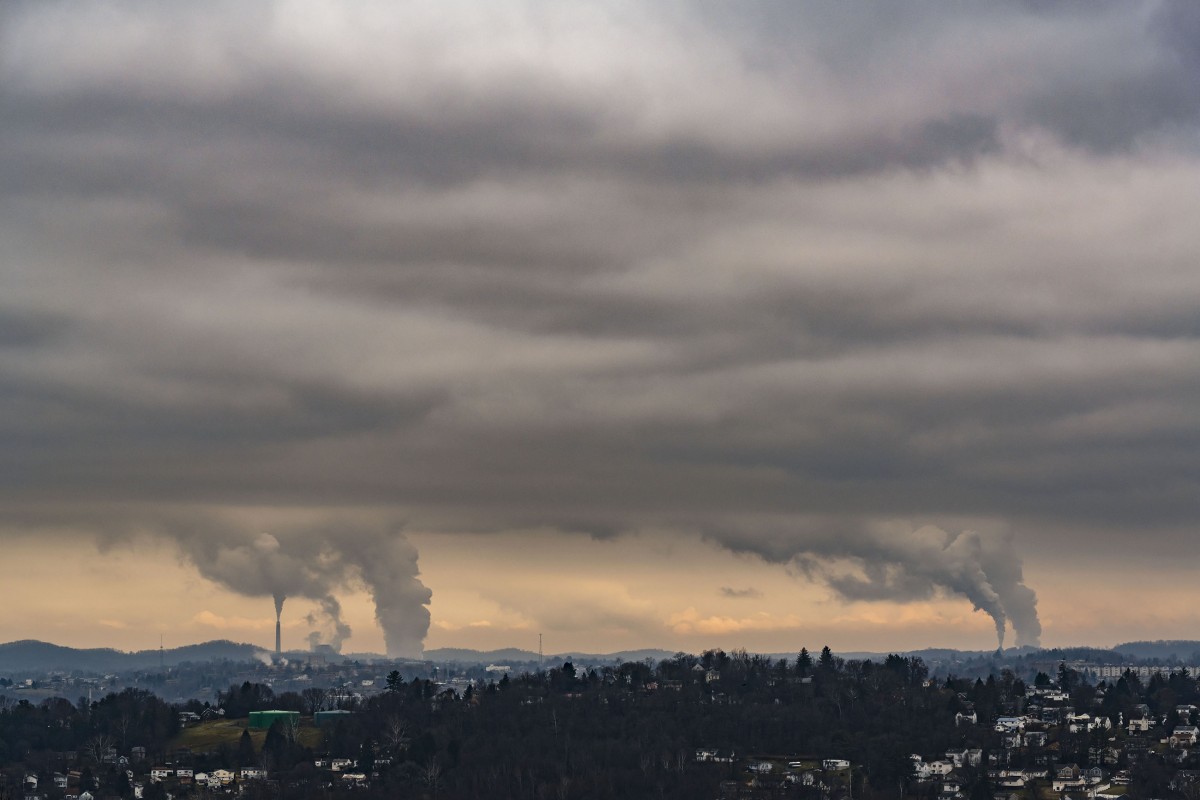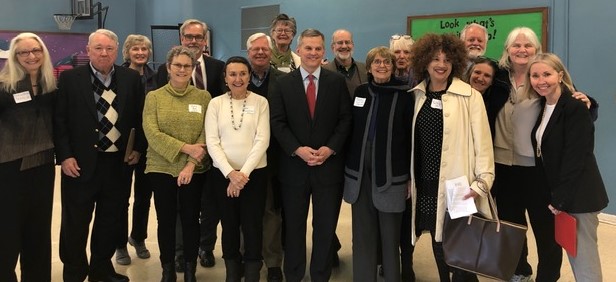Nancy and Rich Potter had the kind of marriage that made other couples jealous. He’d take her on spontaneous trips. She’d wear her Daisy Dukes just for him.
Joyce Birman said her late husband, George, made a terrible first impression. It was his apology for it that made her fall for him, hard.
Vickie Salyers’ husband, Gene, loved hunting and fishing, but he loved being a father and grandfather most of all.
Potter, Birman and Salyers all married eastern Kentucky coal miners. And like countless Appalachian women before them, they each watched as their loved ones became ill.
“He would cough up this real gross stuff,” said Potter. “It even got to the point – we had to raise the head of our bed and put bricks under it so it would raise his head up.”
Appalachia is experiencing what researchers call an epidemic of black lung disease. An investigation by NPR and Frontline found that regulators for decades failed to protect miners, despite knowing that exposure to silica dust was contributing to a surge in the illness. One in 10 coal miners (and one in five coal miners in Appalachia) suffer from some form of black lung.
Vickie Salyers’ and Joyce Birman’s husbands both died in 2013. Nancy Potter lost Rich in 1997.
The women sought federal black lung benefits through the Department of Labor. Their experiences show how a system designed to help provide for coal mining families became a complicated and fraught bureaucracy.
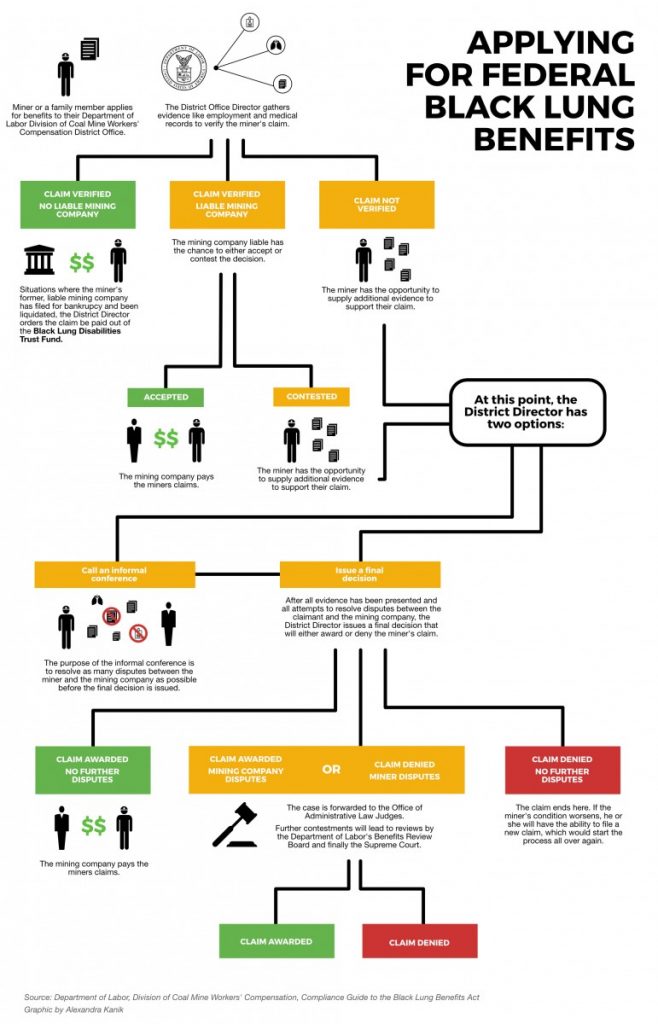
“The black lung benefits process is really adversarial,” said Evan Smith, an attorney with AppalReD Legal Aid who represents miners and widows in black lung litigation. “For people who just kind of file a claim and think they can figure out the system on their own, sadly they’re really at a disadvantage.”
Birman, Potter and Salyers all fought for years to get benefits. The women spoke of their pride in their husbands’ work, and their anger at the coal companies who fought to deny them the benefits they felt their husbands deserved.
Their stories reveal the broader toll of black lung disease on coal mining communities, families, and especially women, whose experiences are often missing from stories about Appalachian mining.
It’s most often women who care for the sick, struggle with the paperwork, and are left with the painful memories.
Vickie Salyers
Vickie and Lowell “Gene” Salyers looked at a lot of trailers before they settled on the one they’d come to call home. “It was the first new thing we ever had,” Salyers remembered.
They moved into the Rush, Kentucky trailer in 2002. “Our first year in this trailer, he bought me a new Crock-pot and a new sweeper,” she said. “I guess I’ll remember that forever. I guess ‘cause we had a new house, he thought I needed a new sweeper to go with it.”
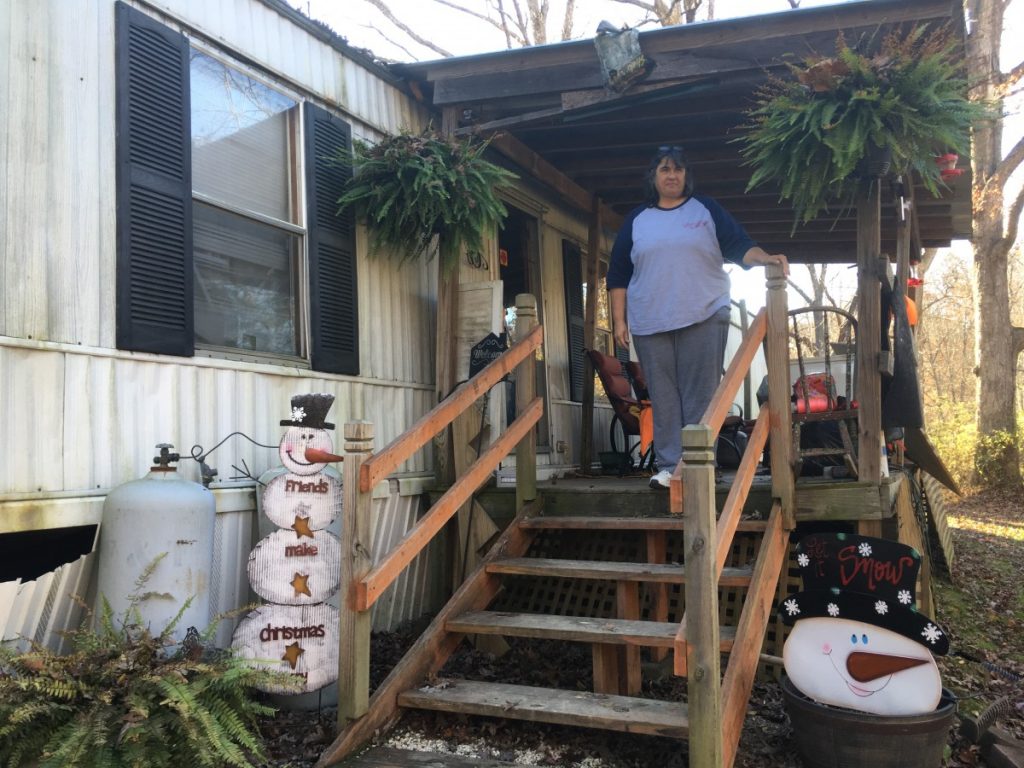
Salyers remembered Gene as a principled man who wanted the best for their family. In Boyd County, Kentucky, where the opioid epidemic is particularly pronounced, Salyers said Gene refused painkillers even in the worst of his illness to set a good example for their son, Zach.
“You have that one person who you love with your whole heart, and he was mine.”
Gene worked at a coal terminal on the Big Sandy River, loading barges with coal. “What Gene had to do at these terminals often involved crushing coal, it involved operating heavy machinery that would get clogged,” said Smith, Salyers’ attorney in her case against Gene’s employer, KenWest Terminals. “It ended up being very dusty work, handling all this coal, even though he was never going underground.”
Gene started to get sick around 2006. He was treated for repeated bouts of bronchitis before receiving a lung cancer diagnosis on Christmas Eve, 2009.
“He had a lot of serious surgeries,” Salyers said. After complications from a lung surgery, doctors left Gene with an exposed wound that Salyers had to clean and treat daily for the remaining four years of Gene’s life.
“He couldn’t hardly eat anything, he couldn’t breathe. He would just gasp.”
The family lost both their incomes as Salyers devoted her life to treating the open gash in Gene’s side. If Zach could sit with Gene for a few hours, Salyers would try to clean someone’s house or mow someone’s lawn to bring in a few dollars.
Congress in 1973 passed the Black Lung Benefits Act, which provides monthly payments and health benefits to miners who are totally disabled due to black lung, or coal worker’s pneumoconiosis (CWP), caused by coal employment. The law also guarantees benefits to the dependents of eligible miners who have passed away.
According to the Department of Labor, there were more than 6,000 federal black lung benefits claims filed in 2018 across the country. Of those, 740 were filed by dependents, most commonly widows.
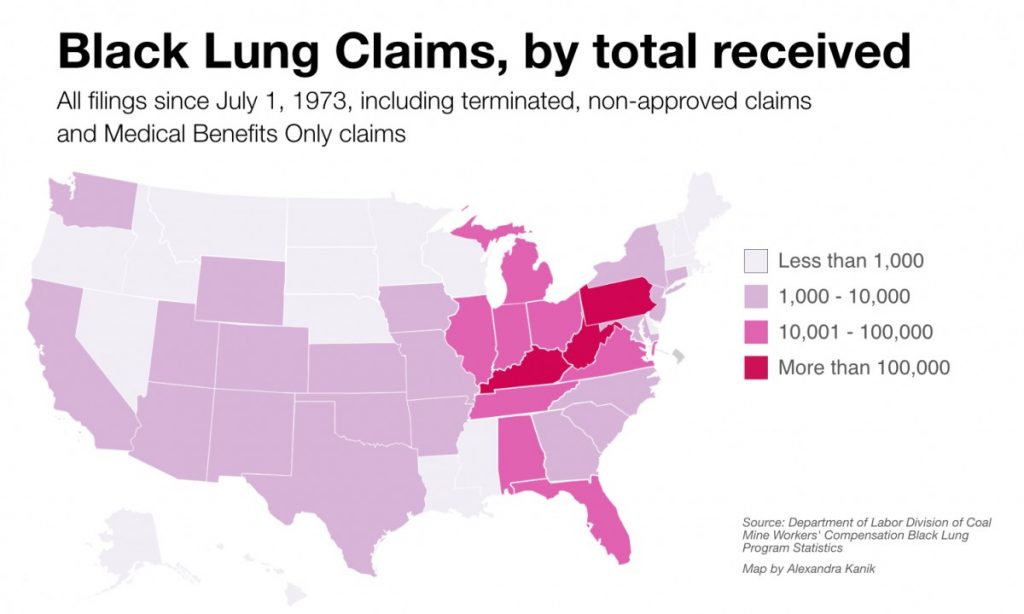
Gene didn’t file his black lung claim until he was already quite sick. “Ultimately,” Smith said, “he didn’t get to see the outcome of his claim because he was so sick when it started.”
Gene died in 2013, in a hospital bed in the corner of the trailer he had been so proud of.
Black lung benefit litigation seemed far too much to think about in the days and weeks after Gene’s death. “They ask you all these questions, and hello, I’m country. I don’t know all this stuff, okay?” But her son reminded her that filing the paperwork was free, and she could use the benefits money.
Salyers’ first claim was denied at the district director level, which is where all federal black lung claims are first filed. The claim was denied, Smith said, because Gene had been too sick to get tested for CWP, “and the judge didn’t really know what to do with that.”
Salyers didn’t take no for an answer. She brought her claim before an administrative law judge, who found in her favor.
KenWest Terminals appealed, arguing that Gene’s lung disease could be attributed to his smoking, not his years breathing coal dust.
Salyers’ case made its way from the initial hearing to the office of the administrative law judge, the benefits review board and finally to the 6th U.S. Circuit Court of Appeals.
As Salyers remembered it, each level brought new anxieties. “They [KenWest Terminals] have so many days to appeal it, and here’s what they do: They wait till that last day. You know, you get excited a little bit, and then they wait till that last day and they appeal it. And that starts the process over again. And that went on for two years, I betcha, or longer.”
With Smith’s help, Salyers has begun receiving $660 per month, a sum that fails to cover her basic needs. Each month she faces a choice between paying her trailer payment or her utility bills.
In October the court awarded Salyers $48,000, but she has not received that payment.
Mark J. Grigoraci, an attorney who represented KenWest Terminals, said he felt the judges in the case had not sufficiently weighed Gene’s heavy smoking and other lung conditions. “Mr. Salyers’ own doctors said he was disabled due to COPD,” Grigoraci said.
But black lung legislation includes a legal definition of CWP for a person who worked for more than 15 years in the coal industry. If a worker is disabled due to “any chronic lung disease … arising out of coal employment,” that person is presumed to meet the legal standard for CWP.
“There can be a tension between what the doctors think the medical consensus is and how the law has defined the conditions that are compensable,” said Smith.
Days before Christmas, 2018, Salyers learned she was facing eviction from the trailer she and Gene called home. Her brother made an emergency payment to keep her in her home through the holidays, but it is unclear how long Salyers has until the trailer is repossessed.
Grigoraci said he didn’t know why Salyers had not received the lump sum in addition to her monthly payment. The Department of Labor did not return a request for comment.
“I’m about to lose the only thing that me and my husband had together,” Salyers said. “If they had to sit here and see him die, they would not put people through that. They would not. They would just give them the benefits and say it was deserved.”
Joyce Birman
George Birman loved gardening. He loved surprising his children with little gifts. And he loved working in the mines. He felt like a father figure to younger miners, Joyce Birman said. She remembered that every day he would leave some of his lunch for his kids to find when he got home.
Birman remembered the lives of the women in her community of Lynch, Kentucky, shaped by the mining industry for as long as she can remember. “When an ambulance would go by near the mines, all the women would go out and line the street to see if it was their husband or not.”
Miners joke, bleakly, that if the big rocks don’t get you, the small rocks will. When George began to lose stamina and struggle for breath, Birman took him to apply for black lung benefits. They were told that at 70 percent, George’s blood oxygen level was too good to qualify. The cutoff is 69 percent.
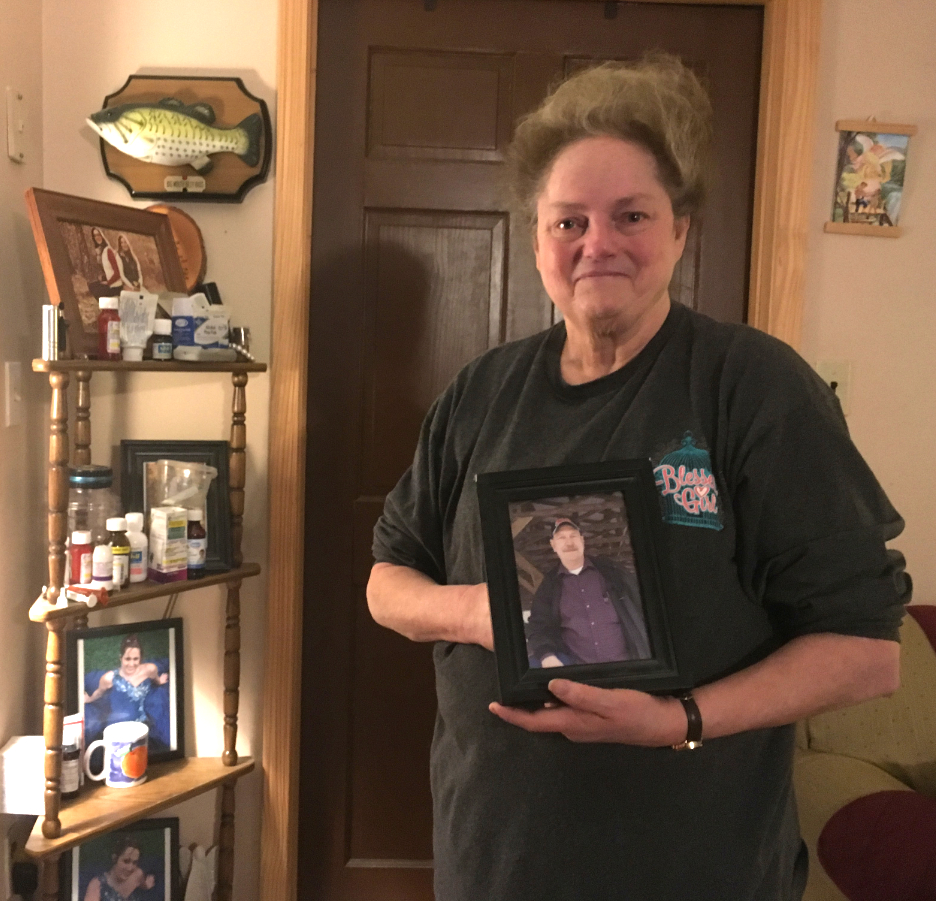
“He slept in the recliner,” Birman remembered, because his breathing prevented him from being comfortable lying down. “When I’d hear him wheezing, it would really upset me, because I thought, ‘Here this man has worked so hard all his life, and they do not want to give him benefits for what he done.’”
“He always told me, he said, if I go first, you make sure and have my lungs biopsied. And I did. And I got his black lung [diagnosis]. I just got my money recently. It took five years, because I started right after he died, but I got it.”
Birman used the money to put a new roof on her house, which she says was badly needed.
Smith, who also represented Birman, said many women use black lung benefits money for home improvement projects. Since the miner was typically the primary breadwinner, spending money on the home is another reminder of the loved one’s providing for the family even in death.
Deeply religious, Birman thinks of George’s sacrificing his health – and, ultimately, his life – in the mine the same way Jesus sacrificed his life on the cross.
Nancy Potter
Rich Potter never let Nancy forget how he loved her. “When I’d go by, he’d wink at me all the time,” she said. “If I put a dress on, he’d tell me, ‘You’re so pretty!’”
Nancy and Rich spent many happy years in Elkhorn City, Kentucky, raising children from previous relationships and from their own. Rich worked as an underground miner. Nancy stayed home with the children and sometimes worked in a nursing home. They loved to go hiking with Nancy’s sister and her husband.
After 20 years working in underground mining, Rich started a small business trucking coal.
Nancy noticed Rich getting sick in the later years of their marriage. “You know, at first, I thought, why isn’t he participating, getting out, playing basketball or doing whatever? But he said he just didn’t – he got tired real easy.”
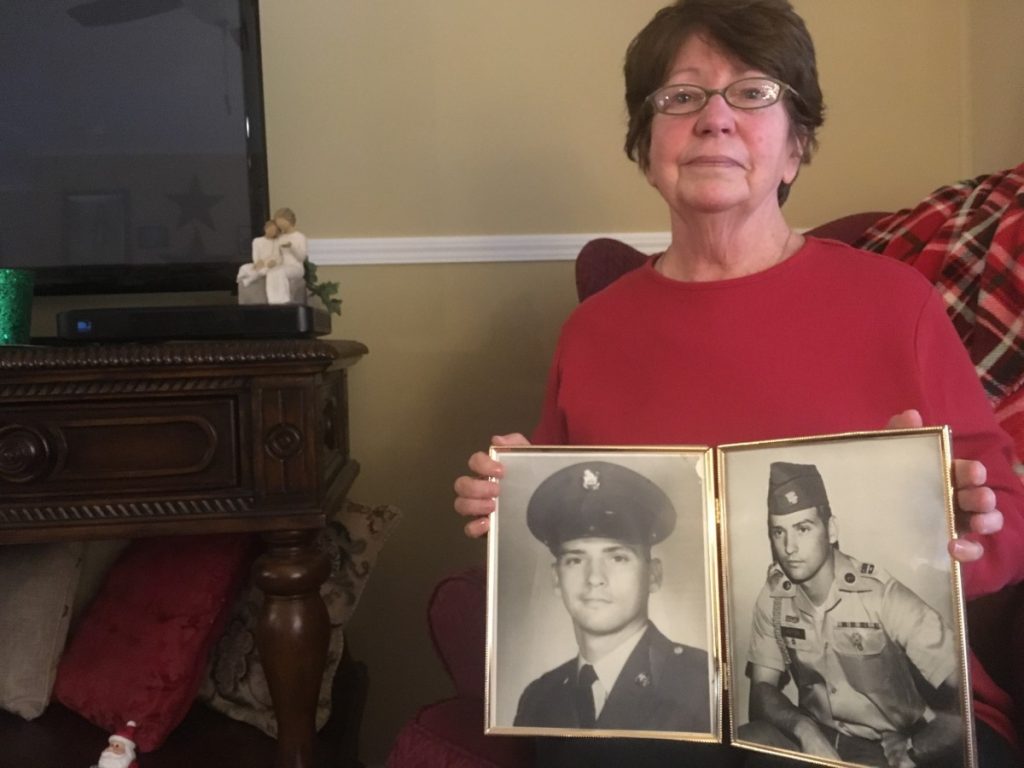
“It took 45 minutes to get the ambulance here from Elkhorn, which is five miles up the road. So we got him on the floor, and my 18-year-old daughter started doing CPR on him. She had real long hair, and I could see the hair just flying through the air, with her working on him. And we’re all crying. And he just looked at me with those big, brown eyes, and he died that fast.”
Potter’s grief disoriented her. She recalled sitting in her car at an intersection near her house, unable to remember a route she’d been driving for years. Her son found her there, crying. But Potter was caring for her ailing mother, and she was in the process of adopting her daughter’s one-year-old child. Taking time to grieve wasn’t an option.
Potter took on some hours in a nursing home, but without Rich’s income, money was tight. She decided to try again to get black lung benefits. Her initial claim was denied. The insurance company fighting against her successfully blamed Rich’s black lung disease on his smoking, not his 21 years of coal employment. Besides, Rich had died of a heart attack, not lung disease.
Potter appealed the decision in 2000. A judge told her the case was closed. A new claim in 2000 was denied in 2002 because, according to Potter, no new medical information was available.
“How could there be new information?” Potter asked. “He’s dead!”
In 2009, the black lung Benefits Review Board found that Potter’s due process rights had been violated 12 years earlier when her case was heard at an informal conference instead of a hearing. Her original 1997 claim was still viable if she wanted to pursue it.
Potter pursued it, and lost.
She was furious. “I just always thought, I’m going to get it any time. Because I know he had black lung. And they know he had black lung. But he died with a heart attack, and they said it had nothing to do with black lung. And I said, how can that be? Because it puts an undue burden on you, on his heart.”
Potter requested another chance. She hired an attorney, Joseph Wolfe, who found that Rich’s autopsy slides had been missing for years. She learned in 2013 that a doctor who had performed Rich’s autopsy has been implicated in a malpractice scandal, and his autopsy was no longer being considered, although he had been in good standing at the time the work was conducted.
Lynn Sutter is a case writer who works with Joseph Wolfe and supported Nancy in her case. “Perhaps in the annals of black lung litigation there has never been a decision that matches this one for cruelty,” Sutter wrote in a petition to the Department of Labor. “What has happened since the filing of the first widow’s claim in 1997 has been exceptional, unusual, singular and astonishing.”
Though Potter was widowed at 45, she says she’ll never love again. “The most I’ll touch a man is hugging the preacher on Sundays,” she said. For her, keeping Rich’s black lung case alive is like holding on to a tiny piece of him. “It’s due him, and I’m going to stay with it and fight it until the day I die.”
This story was originally published by the Ohio Valley ReSource.


